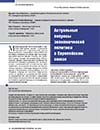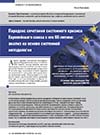Actual Issues of Economic Policy in the European Union
DOI: 10.33917/es-8.166.2019.58-65
Today, the European Union (EU) is facing many challenges in the economic and financial sphere. Europeans are becoming less gullible with EU institutions and less tolerant of supranational interference in domestic politics. As a result, the process of European integration is gradually being modified. It was assumed that the process of economic integration, making Europeans more interdependent, should also lead to cultural assimilation and deeper political integration. Was the project too ambitious, given that Europeans are sufficiently heterogeneous in their economic interests, beliefs and sociocultural values to form a successful political union? Or are current difficulties a consequence of the inefficiency of supranational institutions? And how has the process of European economic integration affected cultural assimilation? All of these issues are becoming increasingly relevant as European integration develops





